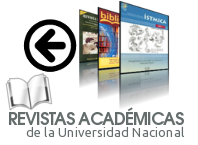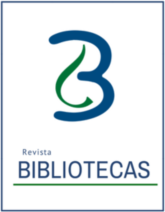The user from the historical, philosophical, theoretical and methodological analysis
Keywords:
library science epistemology, information user, library science paradigmsAbstract
In library science, the relationship between philosophy, theory, methodology, and practice is poorly analyzed and considered, since much of the energy has focused on solving practical problems without taking into consideration aspects such as: epistemological foundation, critical thinking, evolution of concepts, and social changes. This documentary research was conducted to identify and analyze the epistemological development of library science, particularly in aspects related to the information user. A hermeneutic analysis was conducted to find out the philosophical, theoretical and methodological positions of sixty- nine publications of national and international authors. This analysis identifies and describes the epistemological paradigms that have influenced the development of library science, situations that have led to paradigm shifts, and the role of the user according to each paradigm. In addition, the epistemological foundations of the information user were analyzed based on the current paradigm (social paradigm), and from the following representations: library science, the librarian, the library, the concept of information, the concept of information needs, needs assessment, and library research methods.
References
Angulo, N. (1996). “Información: una propuesta conceptual”. En Ciencias dela información. Vol. 27(1):190-195. Disponible en: http://es.scribd.com/doc/88281128/Angulo-Marcial-Noel-Informacion-Una-Nueva-Propuesta-Conceptual(Consultado 07/11/13).
Cañedo, R. (2006). “Algunas aproximaciones teóricas a los servicios de alto valor agregado, diseñados a la medida y orientados al conocimiento”.En Acimed14 (1). Disponible en: http://www.bvs.sld.cu/revistas/aci/vol14_1_06/aci1106.htm (Consultado 25/07/07).
Capurro, R. (2007). “Epistemología y Ciencia de la Información”. En Revista Venezolana de Información, Tecnología y Conocimiento, 1:11-29
Castillo, J. y Leal, O. (2006). “Bibliotecología: ¿ciencia o técnica? hacia un nuevo debate”. En Acimed. 14 (2). Disponible en http://bvs.sld.cu/revistas/aci/vol14_2_06/aci07206.htm (Consultado 20/06/07).
Fernández, J. y Moya, F. (2002). “Perspectiva epistemológica humana en la documentación”. En Revista Española de Documentación Científica. 39 (3): 145-167.
Glazier J.(2002). “Propuesta de un modelo de las relaciones de los paradigmas en una disciplina emergente”. En Anales de Documentación (5).
González, A. (2005). Los estudios de las necesidades y usos de la información: fundamentos y perspectivas actuales. Gijón, Asturias: Trea.
Guzmán, M. (2005). “El fenómeno de la interdisciplinariedad en la ciencia de la información: contexto de aparición y posturas centrales”. En Acimed, 13 (3). Disponible en: http://www.bvs.sld.cu/revistas/aci/vol13_3_05/aci04305.htm (Consultado 05/08/13).
Hernández, A. (2007) “Paradigmas dominantes y emergentes en la bibliotecología y la Ciencia de la Información: continuidad y ruptura de la dinámica informacional”. En Acimed,16 (3). Disponible en:
http://bvs.sld.cu/revistas/aci/vol16_3_07/aci02907.html (Consultado 07/08/13).
Heidegger, M. (1980).El ser y el tiempo. México D.F.: FCE
Hjorland, B. y Albrechtsen, H. (1995).“Toward A New Horizon in Information Science: Domain analysis”. InJournal of the American Society for Information Science6(6): 400-425. Disponible en: http://comminfo.rutgers.edu/~kantor/601/Readings2004/Week3/r5.PDF(Consultado 04/08/13).
Kuhn T. (1986). La Estructura de las Revoluciones Científicas. México: Fondo de Cultura Económica.
Linares, R. (2004).“La presencia cognitiva en ciencia de la información y su entorno”. EnCiencia da Informação,33(1). Disponible en: http://www.scielo.br/scielo.php?script=sci_issuetoc&pid=0100-196520040001&lng=es&nrm=iso (Consultado 04/08/07).
Martín, Y. (2004). “¿Teoría o metateoría? En el dominio usuario”. En Ciencia da Informação, 33 (3). Disponible en:http://www.scielo.br/scielo.php?script=sci_arttext&pid=S0100-19652004000300007&lng=es&nrm=iso&tlng=es (Consultado 24/02/07).
Núñez, I (2004). “Las necesidades de información y formación: perspectivas sociopsicológicas e informacional”. En Acimed, 12 (5). Disponible en: http://bvs.sld.cu/revistas/aci/vol12_5_04/aci04504. (Consultado el 04/06/07).
Peña, T. (2005). “Vinculación del constructivismo con el enfoque sociopsicológico para el estudiode los usuarios de unidades de información”. En Investigación bibliotecológica. 19 (39): 47-72.
Pérez, M. y Herrera, J. (2005). Teoría y nuevos escenarios de la biblioteconomía. Buenos Aires: Alfagrama.
Rendón, M (2005). Bases teóricas y filosóficas de la bibliotecología. México: CUIB/UNAM.
Rendón, M (2006). “Relación entre los conceptos: información, conocimiento y valor”. En Ciencia da Informação, 34 (2).
Sokol, N. y Linares, R. (2006). “Inserción de los métodos matemáticos en el estudio del concepto de información”. En Acimed14(5).Disponible en:http://bvs.sld.cu/revistas/aci/vol14_6_06/aci08506.htm(Consultado 20/03/08).
Vega, R. (2005). “La objetividad y la subjetividad en el desarrollo de la ciencia de la información”. En Acimed,13 (3). Disponible en:http://bvs.sld.cu/revistas/aci/vol13_3_05/aci04305.pdf (Consultado el 24/05/08).
Wilson, T. (2000).“Human information behavior”. InInformation Science (2): 49-55.
Wilson, T. (2002).“Recent trends in user studies: action research and qualitative methods”. In Information und Dokumentation MIB. 11(80): 32-56.
Downloads
Published
How to Cite
Issue
Section
License
Bibliotecas provide immediate open access to their content, based on the principle of facilitating research to the public free of charge and free of charge to promote the global exchange of knowledge.
The journal Bibliotecas is a publication hosted by a public higher education institution, which is supported by public resources. Since its inception, the magazine has offered all its contents free of charge without any restriction on the rights of: reading, downloading and printing in full text. Works published in libraries may be analyzed, quoted and reproduced in whole or in part, mentioning the original source.
The journal Bibliotecas is licensed under the Creative Commons Attribution - Non-Commercial - Share Equal, 4.0 International license; therefore, it is allowed to: share, copy and redistribute the material in any medium or format.

Este obra está bajo una licencia Creative Commons Atribución-NoComercial-CompartirIgual 4.0 Internacional.








